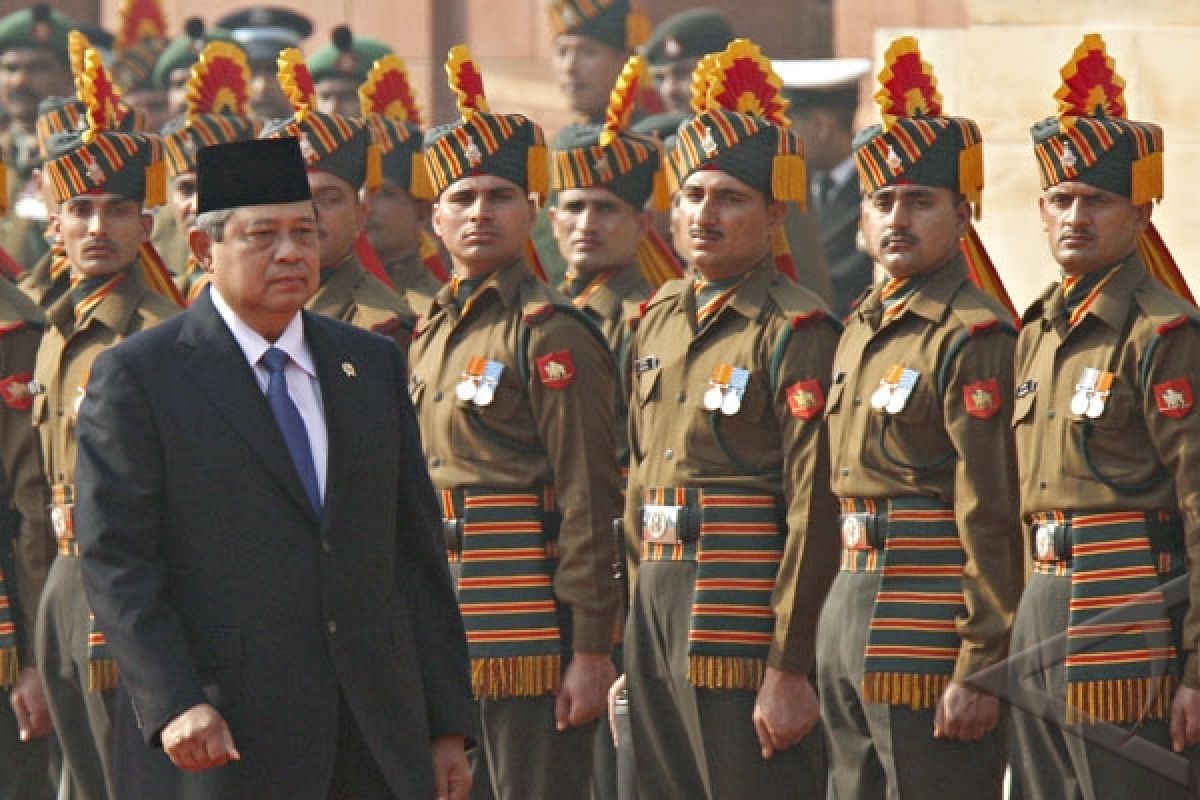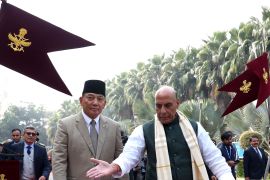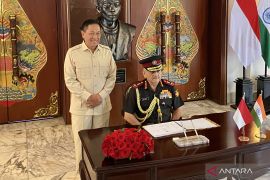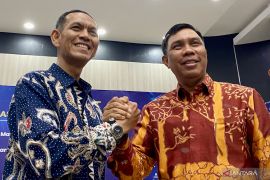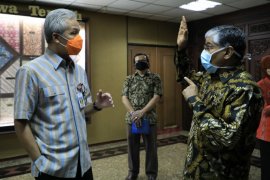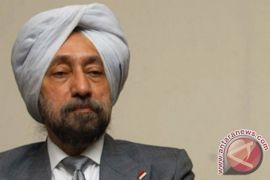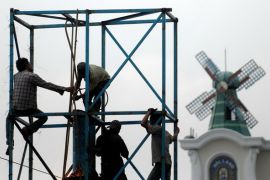Yudhoyono, the first Head of State or Government to pay an official or state visit to India in 2011, is the Chief Guest at India`s Republic Day celebrations, demonstrating the close ties between the two world`s most populated countries.
India's population is over 1.2 billion, or the world`s second largest, and Indonesia's population is more than 237 million, the world`s fourth most populated nation after China, India, and the US.
"The visit to India is intended to step up bilateral cooperation between the two countries in the field of trade and investment," President Yudhoyono said in a press statement at Halim Perdanakusuma airport, eastern Jakarta, before leaving for India on Monday (Jan 24).
Yudhoyono met Indian Prime Minister Manmohan Singh on Tuesday (Jan 25) which was followed with the signing of 16 memoranda of understanding (MoUs) on cooperation in the field of politics, economy, education, and technology.
Achievements and evaluation of strategic cooperation between Indonesia and India, signed in 2005, were discussed at the meeting with the Indian prime minister.
"Indonesia is the second largest business partner with India in ASEAN countries," the president said.
Indonesia and India signed agreements on a number of industrial cooperation projects worth up to US$16.8 billion.
Industry Minister MS Hidayat, a member of the residential entourage, said upon arrival in New Delhi, Monday (Jan 24) said the projects still had to undergo feasibility studies but they had to be started this year.
He said one of the projects involves Indian big company Trimex Group which plans to build a coal-fueled fertilizer plant worth US$1 billion in South Sumatra. India also wants to process iron sand in Papua into titanium and uranium for marketing again in Indonesia.
On January 25 President Yudhoyono met with a number of Indian business leaders such as Anil Ambani from the Ambani Group, Ratan Tata from the Tata Group, Prasad Konetu from the Trimex Group, Khrisna Reddy and Sanjay from GVK Group.
President Yudhoyono attended a business forum participated in by around 500 Indian businessmen grouped in the Association of Chambers, Confederation of India Industry and Federation of Indian Industry of India.
The memorandum of understanding for business cooperation with a total investment of US$16.8 billion was be signed at the business forum.
The target of increasing the volume of trade between the two countries from US$4 billion in 2005 to US$10 billion in 2010 had been reached two years early, namely in 2008.
Indonesia-India trade in 2010 reached a value of 12 billion US dollars after dropping to 9.6 billion US dollars in 2009 due to the global economic crisis.
The volume of trade between the two countries is estimated to double by 2015 thanks to drastic increase in the bilateral cooperation between the two countries in all sectors.
Indonesia`s key exports to India included vegetable oil, crude palm oil, coal, copper ore, cashew nut, newsprint, chemicals and natural rubber. While India exports nylon thread, organic chemicals, iron and steel products, synthetic fiber and cotton to Indonesia.
"The bilateral exports during the past five years had recorded a very positive rise of 30 percent, while the imports 24 percent. Indonesia has enjoyed a trade surplus amounting US$5.2 billion, a significant increase from US$1.8 billion in its trade with India," Indonesian Trade Minister Marie Elka Pangestu said when leading a trade delegation to India in December 2010.
In the investment sector, India`s investments in Indonesia reached US$278 billion in sectors such as textiles, metal, automotive, machinery, coal and electronics. Indian investors operating in India are among others Tata, Reliance, Bajaj and TVS.
This year, some India businessmen will invest US$15 billion in Indonesia.
Indian investors, such as Tata, Adani Group, Power and GBK, were interested in infrastructure sectors such as railway, seaport, airport development projects, shipbuilding, alumina processing and coal mining, Head of Indonesia`s Capital Investment Coordinating Board Gita Wirjawan said in Jakarta recently.
Indian Ambassador to Indonesia Biren Nanda told ANTARA in Jakarta recently that economic condition in India grew fast reaching eight percent in 2010 and ranked the fourth largest in the world based on purchasing power parity, thanks to the country`s over billion population.
In the defense sector, India and Indonesia had signed a Bilateral Agreement on Cooperative Activities in the Field of Defense in 2001. The last meeting of the Joint defense Cooperation Committee at Defense Secretary level was held in New Delhi in June 2010.
Indian Navy Chief of Staff Admiral Nirmal Kurma Verma recently made a four-day visit in Indonesia, to further explore defense cooperation between both states.
Indonesia's defense ministry spokesman, Brigadier General I Wayan Meihio said on January 11, 2011, following the meeting between Defense Minister Yusgiantoro and Admiral Verma, that Indian defense industry was more developed than the Indonesian especially in the chemical, electronic, mechanic and logistical fields.
"Even they have been able to produce missiles, submarines and aircraft carriers. We are still exploring what we can cooperate in the defense industry," he said.
National Defense Forces (TNI) Commander Admiral Agus Suhartono in the meeting with Admiral Verma expressed his hope that cooperation in the field of military exercises and operations with India could be increased in the future.
President Pratibha Devisingh Patil had paid a state visit to Indonesia in December 2008.
As for Indian Prime Minister Dr Manmohan Singh, he and Yudhoyono have been regularly meeting in various international and regional fora, including in the ASEAN Summit in Thailand in November 2009.
In April 2005, Prime Minister Manmohan Singh attended the Golden Jubilee of the Asia Africa Conference in Bandung, West Java. In his speech representing Asian countries, Singh said Asia and Africa must continue to whip up its anti-colonialism spirit which in the current context they must use to face global challenges.
The Golden Jubilee celebration in Bandung came on the heels of an Asia-Africa summit in Jakarta, a two-day meeting intended to rekindle the spirit of the Asia-Africa Conference in 1955, where Indonesia and India had been among important players.
The Bandung Conference inspired the creation of the Non-Aligned Movement in 1961.
The African and Asian nations in 1955 had pledged among other things to mutually support their economic development, vowing to rely on themselves instead of Western foreign aid.
The current intensified trade relations between Indonesia and India have reflected that both countries are still committed to the Bandung Spirit. (*)
Reporter: Fardah
Editor: Fardah Assegaf
Copyright © ANTARA 2011
